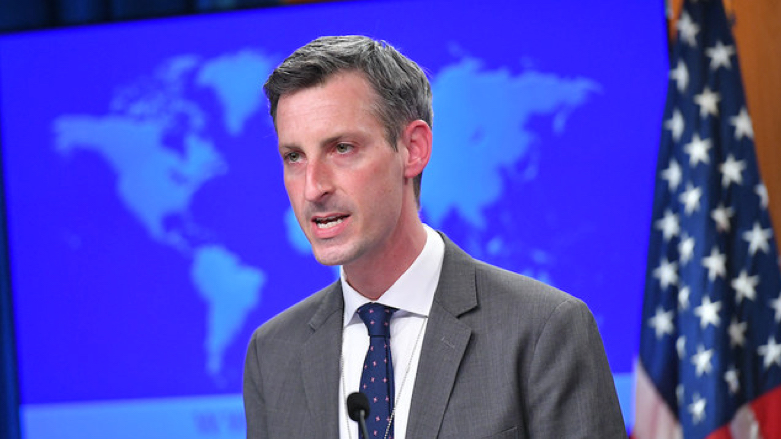US continues to straddle Turkish-Swedish dispute on NATO membership; underscores strategic nature of Ukraine war
The US continued to maintain its ambiguous position on Sweden’s application for NATO membership in the face of Turkish objections, walking a fine line, aimed at offending no one.

WASHINGTON DC, United States (Kurdistan 24) – The US continued on Tuesday to maintain the ambiguous position that it has taken on Sweden’s application for NATO membership in the face of Turkish objections. The Biden administration is walking a fine line, aimed at offending none of the parties involved.
The issue, which once seemed on its way to resolution, blew up over the weekend, when a right-wing Danish politician burned a Koran in front of the Turkish embassy in Stockholm. Ankara responded by cancelling the planned visit of Sweden’s Defense Minister, while Turkish President Recep Tayyip Erdogan announced that Turkey would no longer consider Sweden’s NATO bid.
“Sweden should not expect support from us for NATO,” the Turkish president announced with great authority and drama. “It is clear that those who caused such a disgrace in front of our country’s embassy can no longer expect any benevolence from us regarding their application.”
The Koran burning, carried out by Rasmus Paludan, who leads the Danish far-right party, hard line, was, doubtless, popular among his followers. But it was also a great gift to Erdogan.
Erdogan faces a tough election. He has been in office for a long time: 20 years, while Turkey’s economy is in poor shape. The country’s inflation rate is running at over 100% annually.
It is clear that Erdogan is looking for a foreign policy success to help boost his chances in the forthcoming elections. Indeed, Dr. Sinan Ciddi, an Associate Professor of Security Studies at Marine Corps University, explained that dynamic earlier this month.
“Owing to sagging poll numbers, Erdogan is clutching at every straw to make himself appealing to voters,” Ciddi wrote in “The National Interest.” Ciddi suggested that Ankara’s opposition to Sweden’s NATO membership is to show “Turkish voters that Erdogan is holding the Scandinavian country accountable for its alleged support of the PKK [Kurdistan Workers’ Party.]”
“This is the same reason,” Ciddi continued, “why Turkey threatens to invade Syria—allegedly to go after Kurdish ‘terrorists,’ whose only actions have focused on fighting ISIS.”
There are, of course, risks in such actions, were Turkey to carry it out. The US would be quite angry and might even take punitive action in response to a Turkish assault on its Kurdish partners.
However, such risks do not seem to worry Erdogan, given his latest stance as the defender of Islam. In that respect, this new pose may be relatively good news for the Kurds, particularly in northeast Syria, where a Turkish attack, perhaps with a green light from Moscow, was widely feared.
Erdogan now has a different foreign policy win in advance of the elections that he has announced for May 14, and his administration may conclude that a major attack on the Kurds would be an unnecessary venture, carrying too much risk.
Under ordinary circumstances, Washington would not put up with such political maneuvers. However, Russia’s invasion of Ukraine is now the top US national security concern, and Turkey is playing a key role in mitigating the worst of possible developments in the conflict. So, the US does not want to alienate Erdogan, if there is any possible way to avoid it.
Widespread Muslim Protests after Koran Burning
Protests in numerous Muslim countries followed Paludan’s burning of the Koran. It is impossible to know how much of that was an expression of genuine outrage and how much was manufactured by various parties seeking political advantage.
Protests took place in Baghdad—where they were arranged by pro-Iranian political parties. Almost certainly, those carrying out the protests were ignorant of their political impact: to block Sweden’s application to NATO and facilitate Russia’s ongoing assault in Ukraine.
Read More: Iraqis injured in anti-Sweden protest after Koran burning
On Monday, Price even suggested that the Koran burning might have been “an intentional effort to try to weaken unity across the Atlantic and within and among our European allies and partners.”
But, of course, such considerations were very far from the minds of the protestors in Baghdad and similar places. And because they do not think of such things, it is not difficult for others, like Erdogan, to manipulate them for his own purpose.
Price Declines to Criticize Either Turkey or Sweden
The State Department Spokesperson was pressed repeatedly on Tuesday on the issue of Turkey’s objection to Sweden joining NATO. He would not criticize either Turkey or Sweden. Rather, he repeatedly stated that it was a matter for Turkey and Sweden to decide, along with Finland, another traditionally neutral Nordic country that now, like Sweden, wants to join NATO.
“This is not a bilateral issue between the US and Turkey as much as some might like to turn it into one,” Price stated in response to questioning from a Turkish journalist. “This is a decision that Turkey will have to make in dialogue, in discussion, with Finland and Sweden and, as appropriate, with [NATO] Secretary General Stoltenberg.”
Conversely, pressed to criticize Sweden for permitting the Koran burning, Price would not do that either. He described the burning of the Koran as “reprehensible” and “disgusting.”
“I want to be very clear that no one in this administration is voicing any degree of support whatsoever for this vile action,” he continued.
But he also stated that such things sometimes happened in democracies, and “Sweden is a vibrant democracy.”
Among Erdogan’s charges against the Swedish government, which he used to justify his own outrage and to foment it among others, was the claim that Sweden had approved the Koran burning.
But as the BBC reported, the “protests—not the burning of the book itself—was given prior approval.”
